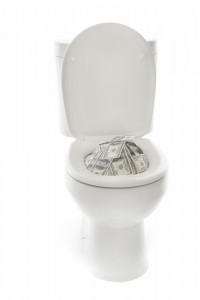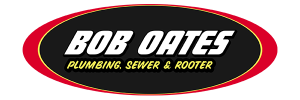4 Ways Your Plumbing Might Be Wasting Your Money
CALL (206) 789-4944
Serving the Greater Seattle Area

Indoor plumbing is one of the great advances of human history. Though most of us don’t really know how our plumbing systems work, we are generally grateful they’re there.
We wake up in the morning to hot water from a tank we rarely pay attention to. We flush a toilet that works as if by magic. The hot and cold air from our HVAC unit comes through ductwork we don’t even consider part of the plumbing system in our home. And whenever one of these conveniences breaks, we call a repair service to fix it.
However, the vast majority of homeowners fail to perform preventive maintenance on their plumbing system, and that costs them hundreds—even thousands—of dollars a year. How? Read on.
1. Bad flappers
One of the most common plumbing issues a homeowner is likely to face is also one of the cheapest to fix: the constantly running water and periodic flushing that happens when a toilet’s flapper has gone bad.
The flapper is the small valve that opens to allow water to flow from the tank to the bowl when you flush, and closes to keep water in the tank afterward. If it starts to leak, then water in the tank steadily flows into the bowl, and slowly rises to the level where it trips the siphon and drains the bowl.
Homeowners who don’t know a toilet works sometimes think this kind of leak means they need to buy a whole new toilet … and they put that expense off for as long as possible. In reality, a new toilet flapper costs two or three dollars and takes about five minutes to replace. Meanwhile, all the water that flows out of the tank costs money.
2. No timer on your water heater
Tanked water heaters constantly cycle on to keep the water in the tank at a constant temperature, and you pay for the energy every time it turns on. If it’s turning on in the middle of the night, when you’re asleep, or in the middle of the day, when you’re at work, then you’re paying for a whole lot of energy that you aren’t using.
A timer turns the heater off when water is not going to be needed; for example, when you’re sleeping or at work. It turns the heater back on in time to be ready for use when you are.
At best, one in twenty homeowners has a timer on their electric water heater, even though installing a timer costs about $50. This is one of the easiest plumbing or home improvement projects you can take on, and it’ll save as much as it costs in the first two months of use.
3. Obstructions
Your plumbing system basically allows water, air, and gas to move through pipes and vents in your home. That motion is always created by pressure differences, mostly driven by pumps that you pay for.
When there are obstructions in your pipes or your ventilation system, they make the flow more difficult, and require more energy for your pumps. Uncorrected, obstructions can also lead to costly and avoidable plumbing problems, which is why the entire plumbing system should be checked and cleaned on a regular basis.
4. Outdated fixtures
The consumption standards for plumbing fixtures, from toilets to shower heads to heat pumps, have improved dramatically in recent years, reducing consumption of both fuel and water and driving research and development that has produced even more efficient fixtures.
For example, a toilet from 15 years ago might use 3.5 gallons of water per flush, whereas a newer toilet must consume no more than 1.28 gallons per flush to meet efficiency standards. If an average toilet flushes four times a day and an older one uses 2.25 gallons more per flush, keeping that old toilet for another year will waste 3,285 gallons of water for which you will have to pay.
CALL (206) 789-4944
Serving the Greater Seattle Area





